Robert Webster
-

Surgical robotics pioneer Robert Webster guides life-saving ideas into reality
He leads groundbreaking work creating robotic tools to make surgeries safer. Now, with a passion for partnership, see how Robert Webster is carving a path for others to take their life-changing innovations and turn them into reality. Read MoreJan 29, 2026
-

Robert Webster elected National Academy of Inventors Fellow, elevated to Institute of Electrical and Electronics Engineers Fellow
Robert J. Webster, the Richard A. Schroeder Professor of Mechanical Engineering at Vanderbilt, has been elected Fellow of the National Academy of Inventors as well as elevated to IEEE Fellow, a prestigious title awarded by the Institute of Electrical and Electronics Engineers to members who have made significant contributions to the fields of engineering, science, and technology. Read MoreDec 15, 2025
-

Vanderbilt Innovation Catalyst Fund continues advancing research with new review committee
The Vanderbilt Innovation Catalyst Fund, launched in 2023, bridges the gap between academic research and real-world applications by supporting projects with commercial and societal potential. To date, the fund has completed six award cycles, distributing 39 grants to VU and VUMC awardees across diverse disciplines. Read MoreSep 4, 2025
-
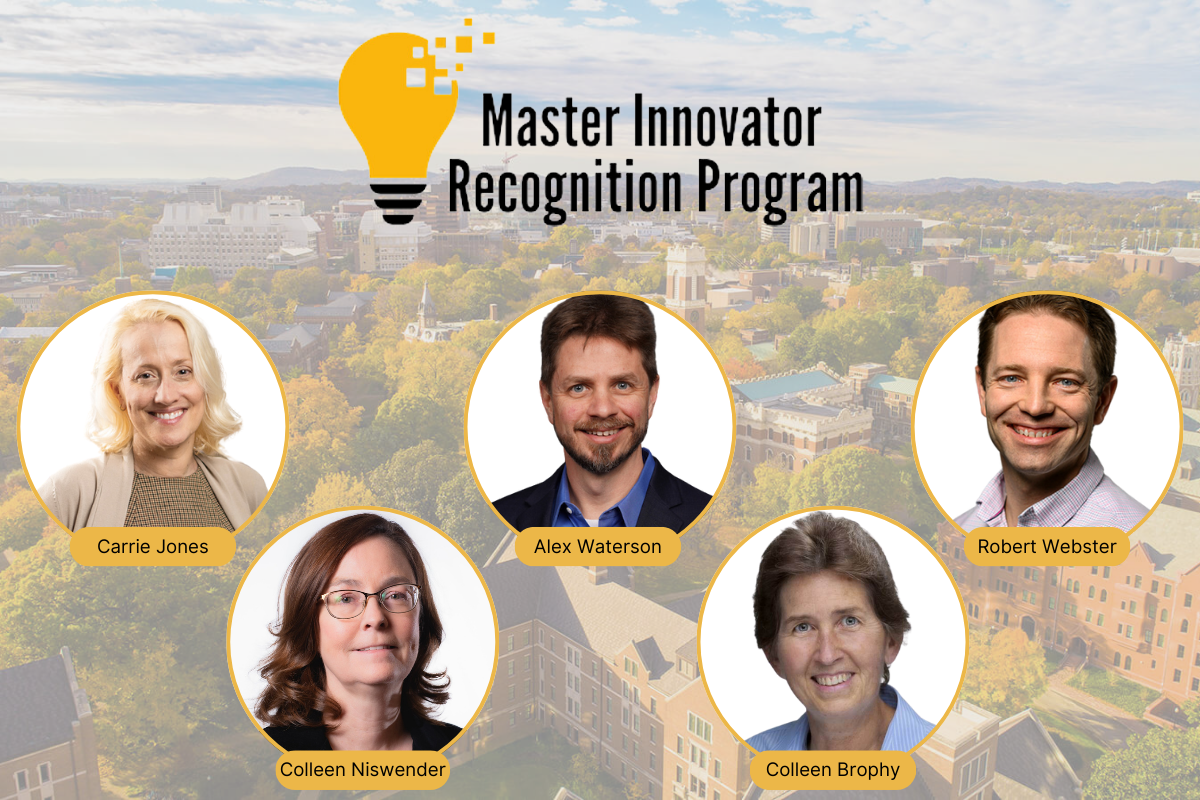
Vanderbilt CTTC honors five pioneering faculty as newly inducted Master Innovators
The Center for Technology Transfer and Commercialization has honored five faculty members as 2024 Master Innovators for their groundbreaking research and transformative innovations. These pioneers, recognized for achievements spanning patents, startups and impactful technologies, exemplify Vanderbilt's dedication to translating academic excellence into societal advancements. Read MoreDec 5, 2024
-

Boundary-Spanning Genius
For John Jumper, BS’07, the road to winning the Nobel Prize in chemistry began with an interdisciplinary education at Vanderbilt. Read MoreOct 30, 2024
-

Unexpected Collaborations: The best collaborations lead to new ways of seeing the world
In today’s world, collaboration is essential in solving problems, bridging the gaps between science, engineering, medicine and the humanities. By prioritizing cross-disciplinary collaborations, Vanderbilt walks the walk—not only across departments—but across schools and cultures. Read MoreOct 2, 2024
-

Chancellor appoints advisory group to advance innovation ecosystem
The group will build upon existing work to leverage Vanderbilt-driven research and innovation to support local community needs, attract entrepreneurial talent and venture investment, and expand our city and region’s innovation capacity. They also will examine infrastructure needs, including dedicated physical space, programs for collaboration and how to foster a culture of innovation. Read MoreJun 4, 2024
-

Vanderbilt leads $12M effort to accelerate real-world impact of biomedical innovations through education, mentorship and funding for aspiring entrepreneurs
Robert Webster and Charleson Bell will lead regional Research Evaluation and Commercialization Hub to propel inclusive innovation and catalyze a medical innovation economy. Read MoreOct 6, 2023
-

Vanderbilt professor to use portion of $2.3 million grant on robot technology to help patients avoid invasive colectomies
Robert Webster, Richard A. Schroeder Professor of Mechanical Engineering and associate professor of medicine and urology at Vanderbilt University, is part of a collaborative team that has received a more than $2.3 million grant to further develop technology that seeks to prevent patients from having invasive colectomies by using steerable robot-like instruments. Under his second startup... Read MoreAug 25, 2022
-

And the Beat Goes On: A resilient Vanderbilt community finds innovative ways to thrive amid the challenges of COVID-19
As the COVID-19 pandemic continues to upend lives in countless ways, members of the Vanderbilt community have shown remarkable resilience in the face of the crisis. Read MoreMay 14, 2020
-
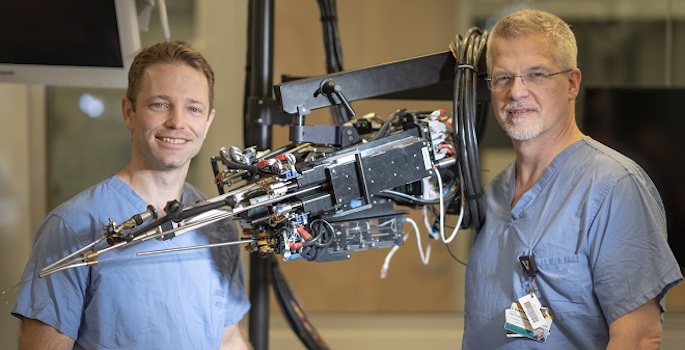
Hand-held robot points to less invasive prostate surgery
Vanderbilt collaborators focused on minimally invasive prostate surgery are developing an endoscopic robotic system with two-handed dexterity at a much smaller scale than existing options. Read MoreJul 18, 2019
-

Hand-held robot points to less invasive prostate surgery
Vanderbilt collaborators focused on minimally invasive prostate surgery are developing an endoscopic robotic system with two-handed dexterity at a much smaller scale than existing options. A key part of the design – telescoping, curved, concentric tubes – received U.S. patent protection in March 2019, the same month the principal investigators secured a $2.1 million R01... Read MoreJul 18, 2019
-
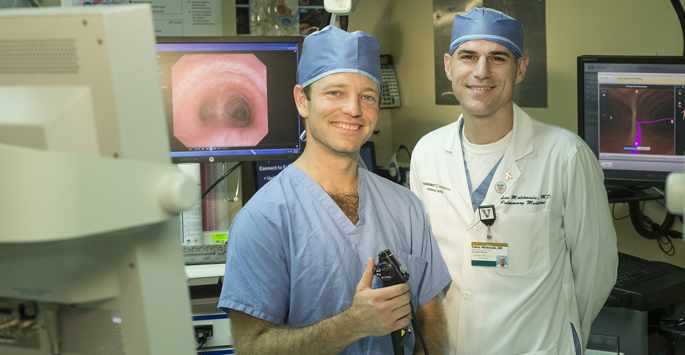
Team to develop steerable robotic needle for biopsies
Collaboration between a mechanical engineer at Vanderbilt University and a pulmonologist at Vanderbilt University Medical Center (VUMC) has resulted in a National Institutes of Health (NIH) R01 grant that will be used to develop a steerable robotic needle to safely biopsy hard-to-reach lung nodules. Read MoreOct 26, 2017
-
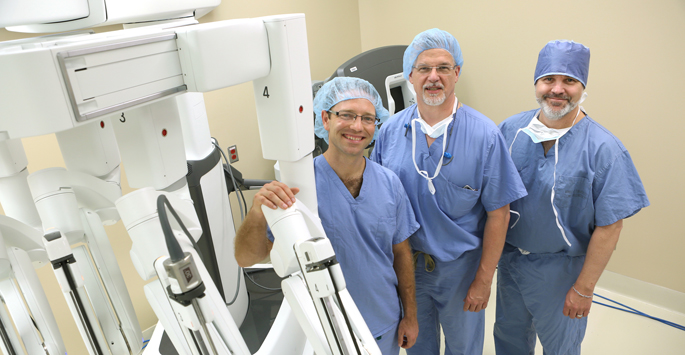
Team developing imaging upgrade for robotic surgery
Removing part of a kidney with minimally invasive robotic surgery rather than an entire kidney when operating for smaller tumors is often best for patients from a recovery and health standpoint, but many surgeons hesitate to do so because of the complexity of the robotic partial nephrectomy procedure. Read MoreOct 12, 2017
-
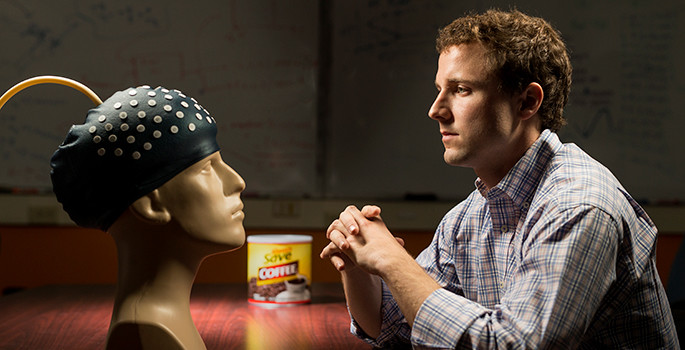
How six cups of ground coffee can improve nose, throat surgery
Vanderbilt engineers have designed a “granular jamming cap” filled with coffee grounds that can improve the accuracy of the sophisticated “GPS” system that surgeons use for nose and throat surgery. Read MoreJun 20, 2017
-
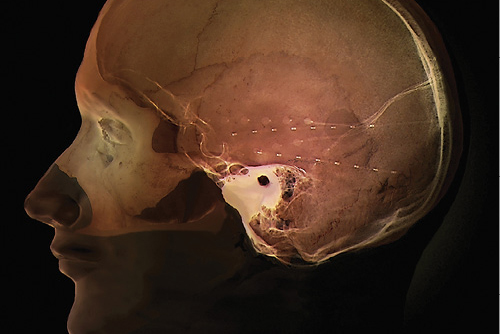
Brain Surgery through the Cheek
For those most severely affected, epilepsy treatment means drilling through the skull deep into the brain to destroy the small area where seizures originate—invasive, dangerous, and requiring a long recovery period. Five years ago a team of Vanderbilt engineers wondered: Is it possible to address epileptic seizures in a less invasive way? Read MoreDec 23, 2014
-
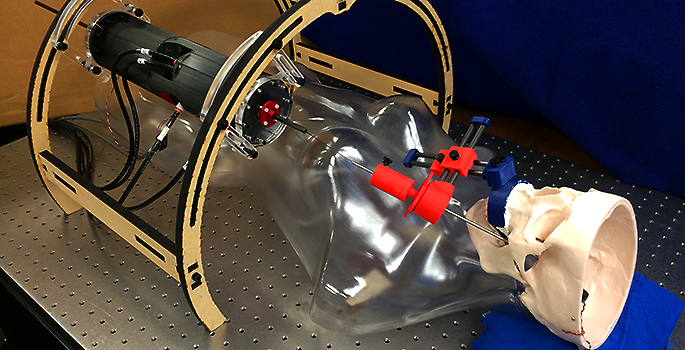
Brain surgery through the cheek
Vanderbilt engineers have developed a surgical robot designed to perform brain surgery by entering through the cheek instead of the skull. Read MoreOct 15, 2014
-
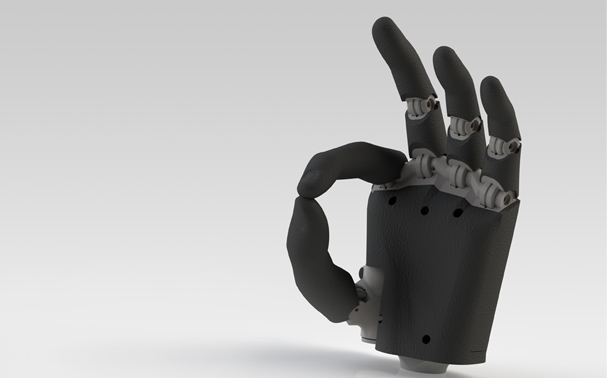
Vanderbilt Medicine: Robotics revolution
In the foreseeable future, robots will be sticking steerable needles in your brain to remove blood clots; capsule robots will be crawling up your colon as a painless replacement for the colonoscopy; and ultra-miniaturized snake robots will remove tumors from your bladder and other body cavities. Read MoreSep 11, 2013
-
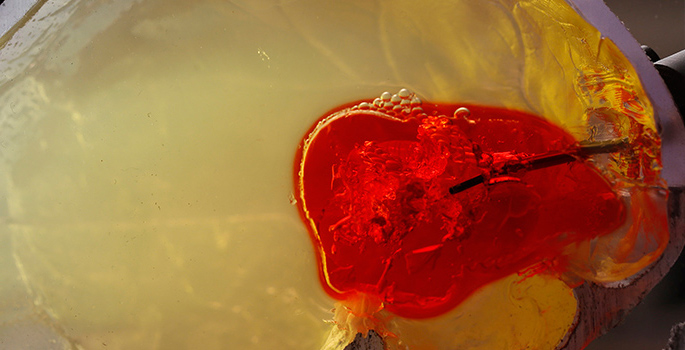
Robot uses steerable needles to treat brain clots
Surgery to relieve the damaging pressure caused by hemorrhaging in the brain is a perfect job for a robot. That is the basic premise of a new image-guided surgical system under development at Vanderbilt University. Read MoreAug 8, 2013
-

Innovation Helps Teach Math to Visually Impaired Students
A new Android app developed at Vanderbilt uses tactile feedback technology to help students with visual impairments to master algebra, geometry, graphing and other subjects that are particularly hard to comprehend without the aid of normal vision. Read MoreJan 13, 2013